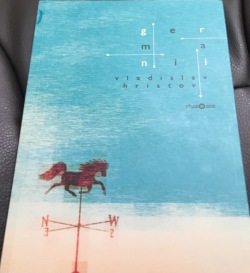 Translated from Bulgarian to German by Thomas Hübner
Translated from Bulgarian to German by Thomas Hübner
(Translations from German to English in this post by me.)
In a year when poetry proved to be the only reading material I found easy to resist, this slim volume of observations on the immigrant life in Germany by Bulgarian poet, Vladislav Hristov, is the only poetry I have read. Makes you wonder, why this volume and not any others. Glad you asked.
- It is the first published translation by Thomas Huebner, fellow blogger and stalwart participant in German Literature Month.
- It is also Thomas’s first venture into the world of publishing, Rhizome Press is owned by himself and his partner.
- I could count this as the Bulgarian book for Marina Sofia’s EU27 Reading Project. (And with no other Bulgarian books in my TBR, this was really important.)
- The content. Once upon a time (and those years really are beginning to feel like a mythical past), I, too, was an immigrant in Germany. I was eager to compare experiences.
Well, that comparison was an interesting exercise because of the inversion. I never looked back when in Germany. The writer of these poems – I’m not sure if it is Hristov himself, because there are no explanatory notes – is obviously homesick.
ich ging auf einem sonnigen sträßchen
in köln
der wind wehte von irgendwoher
den geruch gerösteten paprikas
für einen augenblick fühlte ich mich zuhause
aus meinem traum weckte mich
ein alter mann
der besorgt fragte
ob bei mir alles in ordnung sei
ich wußte nicht
was ich ihm antworten sollte
i was walking down a sunny street
in cologne
the smell of roasted peppers
wafted by on the wind
for a moment i felt like i was at home
but then a concerned old man
woke me from my dream
by asking
if everything was alright
i didn’t know
how i was supposed to answer
Other poems contain thoughts of fruits ripening months before they do in Germany, the need to go to a particular store just to hear some Bulgarian, concern about the loss of his native language. I related to this next one. (Only in my case, the cause of anxiety was a low stock of teabags.)
eine dose mit thymian
das ist mein bulgarisch-sein
es nimmt ab von tag zu tag
a tin of thyme
my bulgarian identity
it diminishes from day to day
This melancholy disappears when the narrator turns his attention to other nationalities, with amazing insights into habits of the Japanese and Italians gleaned while working as a cleaner in a hotel. (Thankfully nothing about the British.) But what of the strange habits of the Germanii?
so viel senf
über zwei kleine würstchen verteilt
als ob man sie dadurch vorm aufessen
schützen würde
so much mustard
spread over two small sausages
as if you were shielding them
from being eaten
I loved the eye cast on modern absurdities, and the imagery, some of which is quite complex. The river Rhine for example, is used in one poem as a metaphor for the barriers between German and immigrant. I don’t know enough anything about metre and form to comment on the pieces as poems or even as prose poems. Yes, I’m someone who likes my poetry to rhyme and, it must be said, my text to be punctuated, and neither is the case here.
That said, I soon got over it, as I was captivated by the changing moods of Hristov’s observations and my own memories of times gone by. If it was the smell of roasted peppers that made him wistful, it’s the smell of roasted almonds that does it for me ….. still.
Wow! Thank youuuuuuuuu! I am very very grateful, and if I haven’t missed anything, this is the first review of the German edition of this book.
A Happy New Year to you and your family and all fellow book bloggers!
The first? A Brit, homesick for Germany, reviews poetry of a foreigner in Germany, homesick for Bulgaria … how ironic, is that?